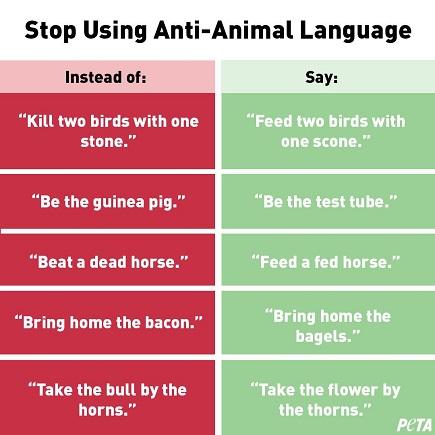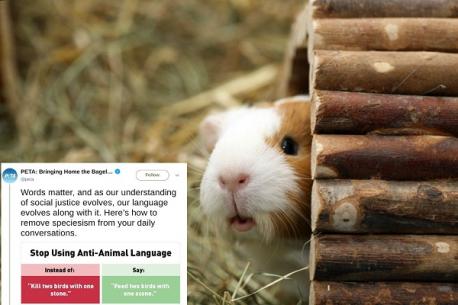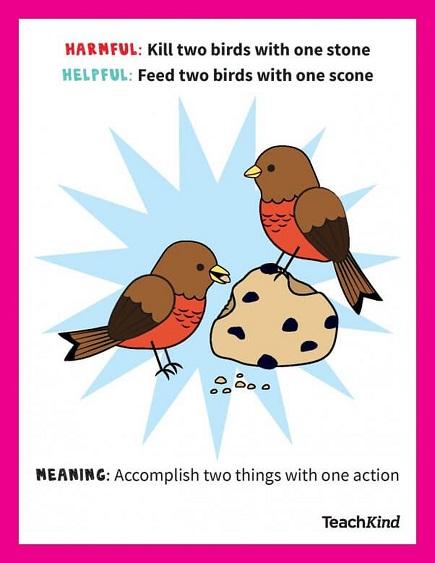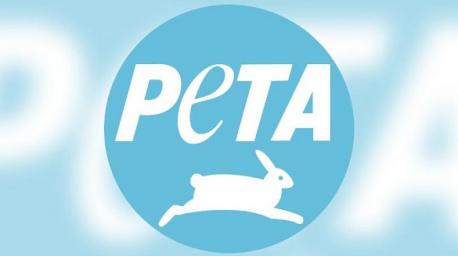Results: Common "anti-animal" phrases
Published on 12/12/2018
Source: CBS News. PETA wants you to stop saying common "anti-animal" phrases.

QUESTIONS
GO to COMMENTS
Comments
1.
1.
They're tried-and-true elements of the American language, but the animal rights group PETA is suggesting that common phrases like "bring home the bacon" and "kill two birds with one stone" carry a harmful message. Idioms like those, the group says, are verbal vestiges of "speciesism" and should be replaced with kinder variations on the theme. "Words matter," PETA tweeted Tuesday. "And as our understanding of social justice evolves, our language evolves along with it. Here's how to remove speciesism from your daily conversations." Are you familiar with this story?

Yes
22%
446 votes
No
78%
1549 votes
2.
2.
The animal rights organization then included a color-coded chart with what they view as offensive phrases on the left in red and what they view as acceptable substitutions on the right in green. In lieu of "kill two birds with one stone," how about saying "feed two birds with one scone"? Instead of "bring home the bacon," try "bring home the bagels. "In the chart, PETA also recommends replacing "take the bull by the horns" with the more innocuous "take the flower by the thorns." Instead of the expression "beat a dead horse," it offers the somewhat comical alternative "feed a fed horse." And last but not least, the animal rights group suggests replacing "be the guinea pig" with a phrase that features an inanimate symbol of scientific experimentation: "Be the test tube." Is this the first time you are viewing this color-coded chart?

Yes
74%
1484 votes
No
26%
511 votes
3.
3.
In a follow-up tweet, the group then compared the use of the original phrases to racist and homophobic language, writing: "Just as it became unacceptable to use racist, homophobic, or ableist language, phrases that trivialize cruelty to animals will vanish as more people begin to appreciate animals for who they are and start 'bringing home the bagels' instead of the bacon." As might be expected, the backlash from skeptical Twitter users was swift, with hordes of people responding in their own tweets that PETA's campaign against some of America's most common phrases is ridiculous. There has also, however, been a flood of tweets from social media users sympathetic to PETA's cause. Some have even chimed in with additional suggestions for more animal-friendly substitutions. Instead of "curiosity killed the cat," for example, one Twitter user suggested "curiosity thrilled the cat." Which do you agree with on the use of animal phrases?

America's most common use of animal phrases should still be used (example: bring home the bacon).
54%
1084 votes
There should be more animal-friendly substitutions being used (example: bringing home the bagels).
18%
356 votes
N/A
28%
555 votes
4.
4.
Now, PETA is using those user-generated ideas as the inspiration for a new social media call for innovative suggestions. "To the haters: with so much negativity in the world, why not lighten up and use language in a way that encourages being kind to animals?" the group wrote on Twitter today. "To everyone else: add your own anti-speciesist phrases below!" And if those phrases end up being both clever and humane (both fun and non-violent) then perhaps, as the popular idiom goes, they may truly be the best of both worlds. Do you think by using more animal-friendly substitution phrases, it will help encourage the public to be kinder to animals?

Yes
16%
324 votes
No
54%
1070 votes
Undecided
30%
601 votes
5.
5.
Lastly: Do you agree or disagree with what PETA stands for?

Agree
27%
548 votes
Disagree
24%
472 votes
Undecided
25%
503 votes
I have no opinion!
24%
472 votes
COMMENTS

